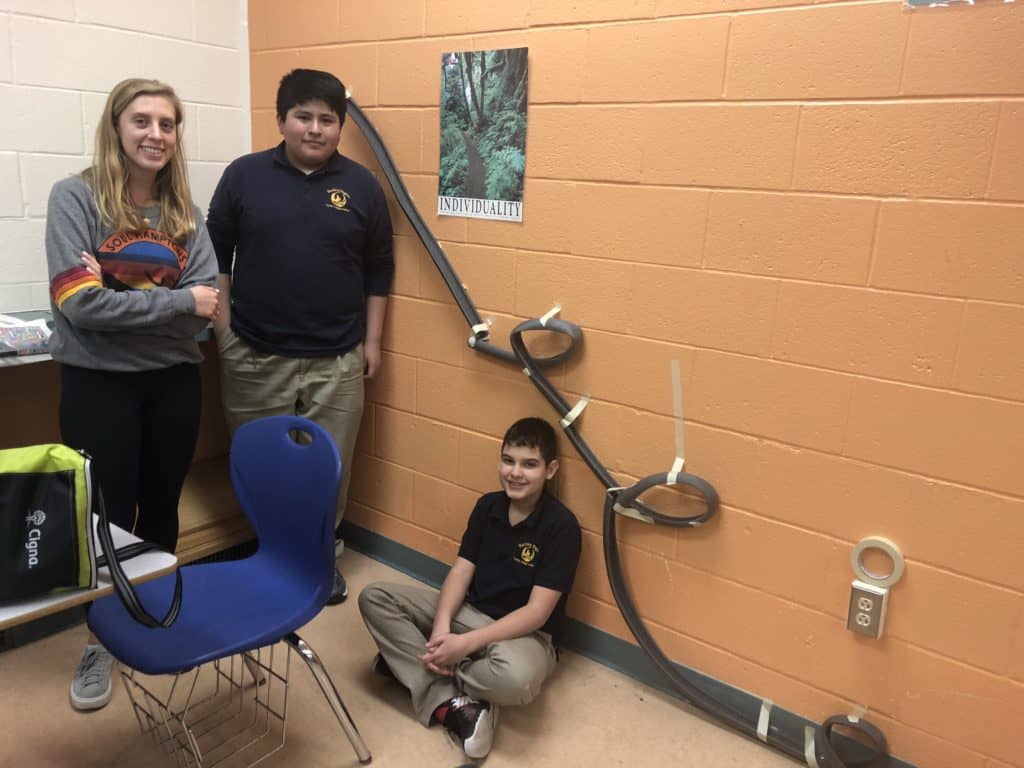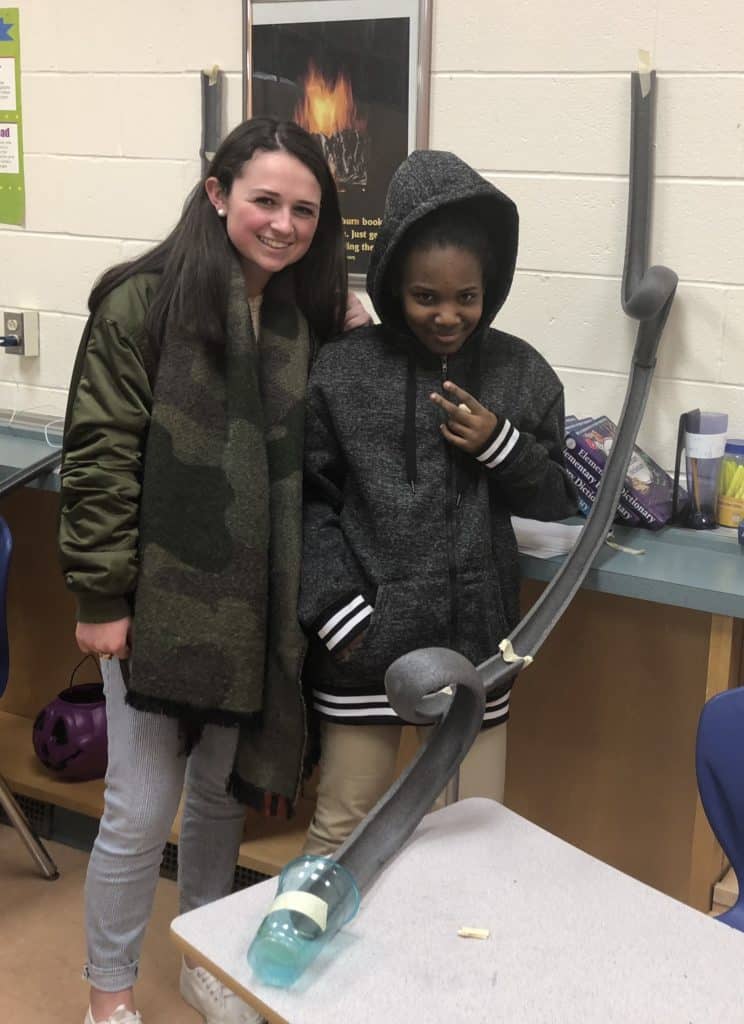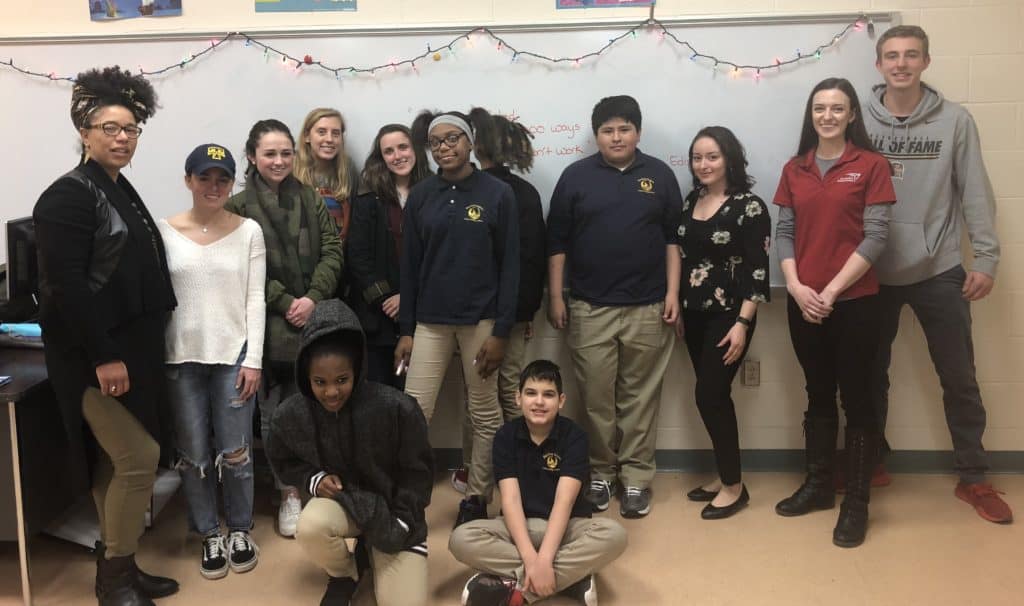Trinity Students Support Middle Schoolers in Jones-Zimmermann Academic Mentoring Program
“We’re about to have an innovation,” Trinity College student Hunter Moore ’21 announces to the room.
Hunter is working with Steve, a student at the Hartford Magnet Trinity College Academy (HMTCA). They are about 15 minutes into a science exercise involving a marble and some foam tubing. Hunter and Steve are part of the Jones-Zimmermann Academic Mentoring Program (J-Z AMP), which connects students from Trinity as mentors to middle school students from HMTCA.
It’s Thursday and the students and mentors have a treat: Aoife Ryle, a visiting educator from the Connecticut Science Center, is on hand for a lesson on motion and inertia built around roller coasters. The object: build a “roller coaster” for a marble with tracks made of halved, 2-inch foam tubing and masking tape. The marble must be able to run all the way down the finished coaster, which must include two loop-the-loops. It is not as easy as it sounds—marbles fly across the room as students try to perfect their method.

Next to Hunter and Steve, Crystal and her mentor, Miranda Wheeler ’21, progress steadily. Their coaster has a high, rounded loop and they are beginning to construct a second loop. On the other side of the room, Michael and Yaviel, working with their mentor, Talia Lewis ’19, have taken a different approach to the problem. Rather than build their coaster perpendicular to the wall, like everyone else, Michael and Yaviel have embraced the daring strategy of working parallel to the wall. They decide to go all-out with three loops.
The Jones-Zimmermann Academic Mentoring Program has been a mainstay of Trinity’s community engagement since 2001. Supported by generous annual grants from the Marie and John Zimmermann Fund, the program pairs Trinity students with middle school students from HMTCA for academic enrichment activities throughout the year. This 2018-2019 academic year, the Zimmermann Fund’s generous support of J-Z AMP amounted to $40,000. The fund has directed almost $1.5 million to support J-Z AMP at Trinity and has been recognized on the college’s Wall of Honor, reserved for those individuals, businesses, and organizations that have had institution-wide impact at Trinity since its founding in 1823. The fund has also supported similar programs at Yale and Sacred Heart University with equal generosity.

J-Z AMP aims to follow students from sixth grade through middle school. For students who remain with the J-Z AMP, the consistency and support are beneficial. The program helps students who teachers have identified as needing extra support to establish a more solid academic footing. Ideally, the program matches one Trinity student as mentor with two HMTCA students, forming a unit in which the middle-schoolers learn and support each other.
Each student-mentor team contends with its own challenges with the roller coasters, which they diligently work through together. For example, Cherron’s team tackled their challenge by thinking outside the box. Rather than a loop-the-loop, he has put a twist in his track. But the marble keeps flying off, rolling through the desks and across the room. Ryle asks a few leading questions, and Cherron adjusts the angle of his track. Now, the marble’s momentum is better directed and it zips down and into the target cup with a satisfying plunk.
One by one, the teams demonstrate their coasters. Most succeed, though some need a couple of attempts. “Next time, I want to make it twice as big,” Yaviel announces after the marble makes it all the way through his record-setting three loops. For Yaviel and others, J-Z AMP has created an environment where experiments like this can take place, and in the process, students develop greater drive for academic achievement.

Trinity mentors involved get the benefit of connecting with their surrounding community. In addition, the mentors can apply their liberal arts education to problem-solve in a classroom environment, learning how to engage the students, and make creative solutions to convey the messages of the curriculum. For some mentors, they will develop ongoing relationships with the students in their mentoring cohort, who may be in the program for multiple years as Trinity mentors progress with their own education and involvement with J-Z AMP.
Following the marble experiments, Beatrice Alicea, who coordinates the program for Trinity, gathers the mentors and students to discuss a quote from Thomas Edison, “I have not failed. I’ve just found 10,000 ways that won’t work,” and how it applies to their successes and failures that afternoon. They will no doubt encounter bigger challenges than a marble roller coaster ahead, but they will have the guidance of their Trinity mentors to help them along the way.
